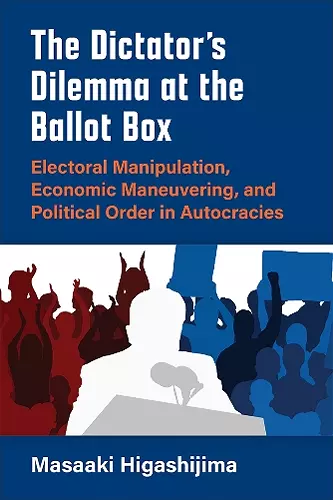The Dictator's Dilemma at the Ballot Box
Electoral Manipulation, Economic Maneuvering, and Political Order in Autocracies
Format:Paperback
Publisher:The University of Michigan Press
Published:7th Jun '22
Should be back in stock very soon

Contrary to our stereotypical views, dictators often introduce elections in which they refrain from employing blatant electoral fraud. Why do electoral reforms happen in autocracies? Do these elections destabilize autocratic rule? The Dictator’s Dilemma at the Ballot Box argues that strong autocrats who can garner popular support become less dependent on coercive electioneering strategies. When autocrats fail to design elections properly, elections backfire in the form of coups, protests, and the opposition’s stunning election victories. The book’s theoretical implications are tested on a battery of cross-national analyses with newly collected data on autocratic elections and in-depth comparative case studies of the two Central Asian republics of Kazakhstan and Kyrgyzstan.
“Why don’t dictators simply rig elections? In this timely and insightful book, Higashijima explores how authoritarian leaders assess the costs and benefits of fraud, sometimes turning instead to economic tools to secure victories. With cross-national data and detailed case studies, he examines not just the choices dictators make, but also what happens when they miscalculate.”
—Daniel Treisman, Professor of Political Science, University of California, Los Angeles, and co-author of Spin Dictators: The Changing Face of Tyranny in the 21st Century
“The Dictator’s Dilemma at the Ballot Box makes an important contribution to understanding politics under authoritarianism and regime stability. Masaaki Higashijima presents a clear, unified model that explains why dictators turn to blatant electoral fraud, institutional manipulation or economic maneuvering as they balance their needs to win big and yet to maintain credible elections, and suggests when their efforts might fail. His detailed study, combining global quantitative analyses and well-documented case studies from Central Asia, yields valuable insights for scholars and analysts alike.”
—Ellen Lust, Founding Director of the Program on Governance and Local Development and Professor in the Department of Political Science at the University of Gothenburg
“Most dictatorships in the world now hold elections. But electoral contests in these settings can be risky: they might help despots stay in power if they win convincingly or they might spark destabilizing protests if they cheat. So why do some dictators hold elections that look fair while other dictators hold rigged contests? The Dictator’s Dilemma at the Ballot Box offers a compelling answer to this puzzle: dictators hold fair elections when they can mobilize electoral support with economic redistribution; and if dictators can't maneuver the economy to boost popular support, they manipulate the election by changing the rules and cheating. With original data and novel designs, Higashijima provides an impressive range of evidence demonstrating how dictatorships navigate electoral politics. Essential reading for anyone interested in understanding how elections shape political regimes.”
—Joseph Wright, Pennsylvania State University
“The Dictator’s Dilemma at the Ballot Box is a fascinating exploration into how contemporary authoritarian regimes design their electoral institutions, manipulate their economies, and engage in forms of electoral fraud. Empirically rich and highly illuminating, Higashijima tackles essential questions about how electoral authoritarian regimes operate, both in a cross-national context as well as in the cases of Kazakhstan and Kyrgyzstan.”
—Lisa Blaydes, Professor of Political Science, Stanford University
“This book is an outstanding contribution to the field. It informs our understanding of a variety of understudied features of authoritarian rule, including the reasons why fraud varies across autocracies, why dictatorships have different electoral rules, the tradeoffs dictatorships must consider in their election strategies, and the consequences their choices have for authoritarian survival.”
—Erica Frantz, Associate Professor of Political Science, Michigan State University
Winner: 44th Institute of Developing Economies’ Award for the Promotion of Studies
on Developing Countries.
Honorable Mention: Association for Slavic, East European, and Eurasian Studies (ASEEES) 2023 Ed A. Hewett Book Prize
* ASEEES Ed A. Hewett Book PriISBN: 9780472055319
Dimensions: unknown
Weight: unknown
366 pages